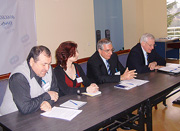GEORGIA: Civil society leaders elaborate recommendations on peace-building
Under the aegis of the European Union’s Instrument for Stability, the project “Strengthening European Partnerships for Crisis Prevention and Response” is organising civil society round table events to develop policy recommendations for EU institutions on how to utilise the peace-building functions of civil society organisations in Georgia.
The first round table session, co-organised by the Ludwig Boltzmann Institute of Fundamental and Human Rights (LBI-GMR), Vienna and the International Center on Conflict and Negotiation (ICCN), Tbilisi took place on 12-13 April 2010 in Tbilisi. The Head of the EU Delegation to Georgia, Ambassador Per Eklund, opened the event with a keynote speech stressing the importance of civil society involvement in crisis prevention, peace processes and post-conflict recovery. During the following two days, representatives of Georgian civil society and international organisations, with facilitation by Georgian, Austrian and EU Delegation experts, discussed the role of Georgian civil society in peace building and its potential for improvement.
The violent conflicts of the 1990s in Abkhazia and South Ossetia are still the dominant theme of public discourses on crisis prevention, conflict transformation and peace-building in Georgia, all the more so following the August 2008 war between Georgia and Russia. However, in the almost 20 years since Georgia achieved its independence and the conflicts over Abkhazia and South Ossetia erupted, the country has embarked on a path towards democracy and integration into the European political, economic and cultural space. This development signifies that Georgia is dedicated to fostering and adhering to European and standards of liberal democracy, which comprise a commitment to the peaceful regulation and transformation of the conflicts that may break out along the various fault lines of society.
The European Union, in extending its Neighbourhood Policy and recently the Eastern Partnership to Georgia, has acknowledged its role in the country’s democratic transformation processes, including in the process of peaceful conflict resolution. In this effort, the EU has recognised the importance of strengthening and harnessing the potential of Georgian civil society to contribute to a peaceful reconciliation of society’s diverging interest, and is contributing towards these goals through advice and funding.
On 9 July 2010, Georgian and Austrian civil society experts gathered at a second round table to discuss civil society recommendations on peace building in Georgia. The participants discussed draft recommandations which had been developed by a core working group on the basis of the outcomes of the April round table and provided their expert input to improve and fine-tune the document. The draft now contains brief problem analyses of seven priority areas for action on peace-building as well as concrete recommendations towards civil society itself, the Georgian government and international donors on how to strengthen the third sector in confidence- and peace-building, crisis prevention and reconciliation. The document is published in printed form in both English and Georgian and is available for download.

